#and definitely NOT about fictional characters
Explore tagged Tumblr posts
Text
Mars Dominant Themes — 𝐍𝐚𝐤𝐬𝐡𝐚𝐭𝐫𝐚 𝐎𝐛𝐬𝐞𝐫𝐯𝐚𝐭𝐢𝐨𝐧 𝐒𝐞𝐫𝐢𝐞𝐬 (part 1) 𝐨𝐟 𝐩𝐚𝐫𝐭 𝟕
warnings!: mentions of mass-suicide and violence.
Nakshatra rulership indicates deeper behavioural patterns and specific talents rather than one’s fundamental personality, which is more governed by rashi rulership. This is why I do not prefer mixing rashi and nakshatra observations together, though there are exceptions — such as the rebellious and tantalizing nature of Mars being innately found in all Mars nakshatras and Mars signs. For example; Mars nakshatras are found in many well-known sex symbols, Anuradha may embody the Lilith archetype, Ashwini and Jyestha are known for being audacious and individualistic, while Bharani poetically merges violence — a radical form of rebellion — with beauty, making them one. But the consistent theme observed for this exploration is that Mars nakshatras focus more on bursts of energy, controversy, and the refinement through that.
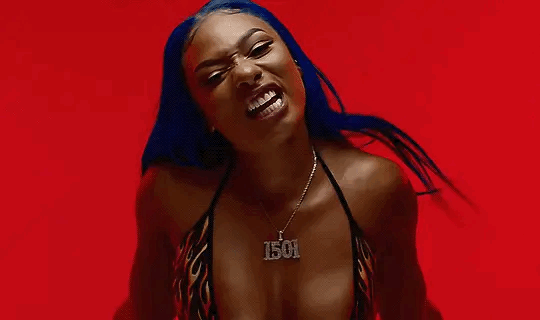
There's definitely a heightened sense of energy and even aggression in this section of Earth & Air signs, supporting their pure drive through the mentioned themes I'll be touching on. And the themes are very typical of this planetary rulership.
There is this genre in challenging natural order and pursuing one's ideals, a recurring theme in Mars nakshatras, especially in ways that are so radical and even explosive. This can also be seen in mythologies that are particularly associated with Martian figures, such as Andhaka.
I may see an association with Andhaka to the Mars energy found in Ashwini nakshatra, as Andhaka was born blind, symbolizing an unreasonable destructive force. He also symbolizes darkness and ignorance, the combination of Mars's unyielding energy with Ketu's tamasic nature perfectly pointing to Ashwini. Yet, the guna of Dhanishta and Chitra is tamasic — meaning that Andhaka is a greater representation for these nakshatras. Both are considered demonic, which solidifies their connection to Andhaka who is considered a malevolent demon.
Mars is generally the planet most associated with Andhaka, as it highlights aggression and the drive for power. One of Andhaka's closest parallels are the fictional characters, Thanos and Ultron, from the Marvel Cinematic Universe. These parallels lie in the legend of Andhaka, this powerful asura (demon) who, despite his humble beginnings, sought to reshape existence according to his own vision. Though blind from birth, he gained invincibility through immense penance and sheer willpower (symbolizing the level of discipline this planet represents) and he commanded an army so strong that it threatened the cosmic balance. Andhaka believed himself worthy of ruling the universe, waging war against Shiva himself, and refusing to yield even in the face of destruction.
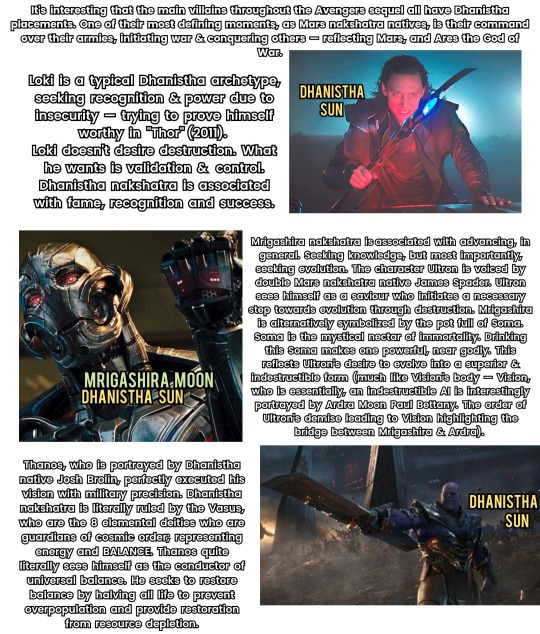
Like the character Thanos, Andhaka saw himself as a necessary force of change, willing to eliminate obstacles — including the Creator (Shiva) — to establish a new order.
Even the character Kylo Ren is another Dhanistha archetype, being played by the Dhanistha Ascendant native Adam Driver. Kylo has a vision of a new order, which is not just about destroying the past, but reshaping the galaxy according to his own ideals.
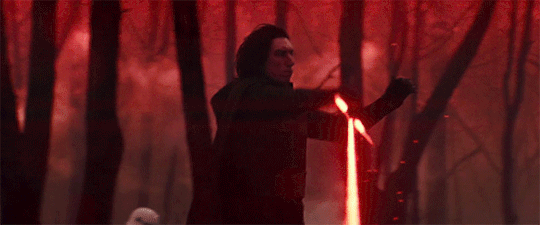
His intensely ambitious and destructive qualities, but also his capacity for transformation, signify the Mars influence. This being a tamasic nakshatra means that it thrives on intensity, chaos, destruction, and rebirth, reflecting his volatility & his drive to tear down the past to build something new (we also see his rise to power when he seizes control of the First Order after killing Snoke, wanting to be his own master rather than to continue to serve a higher authority. Though Dhanistha instills servitude, there's still potential for aggressive rebellion, as this nakshatra reflects self-empowerment — however extreme it may manifest).
Unfortunately, we have seen this mindset, in real time, with world leaders who forced a new order in their own country which essentially became a threat to everyone but them.
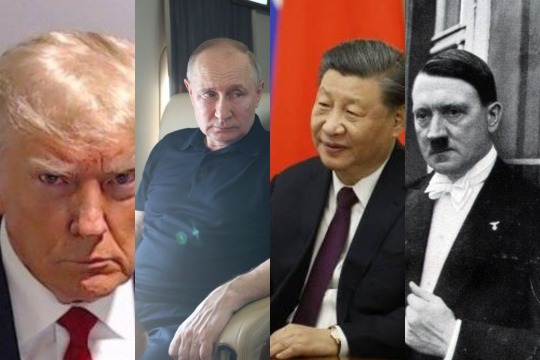
Donald Trump, who has Mrigashira Sun, easily comes to mind. Vladimir Putin, who Donald Trump now wants to take after, could have possible Chitra ASC. Xi Jinping also has Mrigashira Sun. And Adolf Hitler, who had a lot of Mars influence, with Chitra ASC and Ashwini Sun conjunct Mars. Regardless of all of their different ideals, they are examples of Mars functioning not only as a destabilizing force, but as a domineering one too. It needs submission. And so Martians will always have minions and enablers.
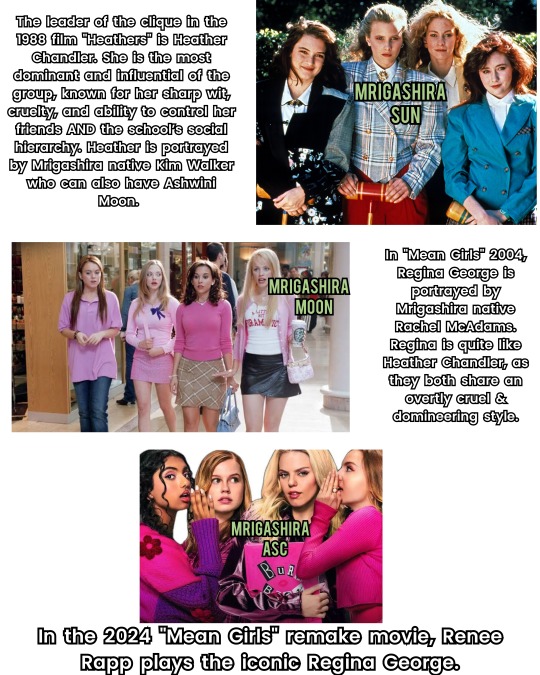
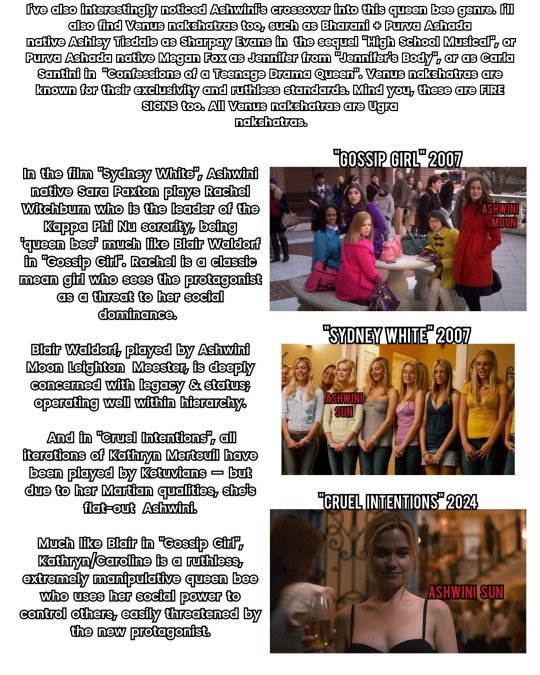
Again, Ashwini is Mars energy at its highest levels due to the nodal influence. And according to Claire Nakti, in her Serial Killer exploration, she states that whatever Ketu is conjunct, the themes of that planet become exaggerated or extreme — due to its sucking receptivity; further giving a perspective on Mars and Ketu energies together — which are both tamasic.
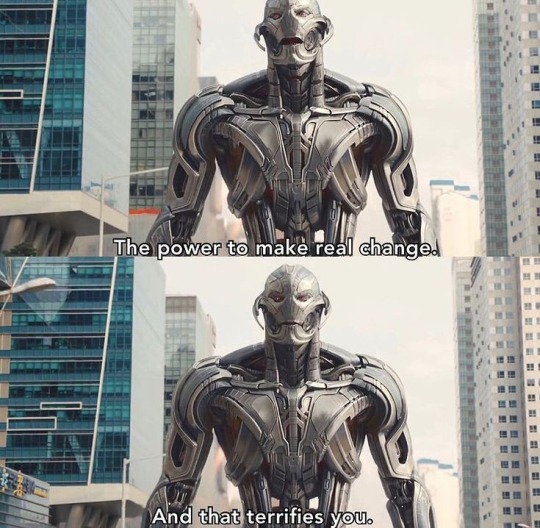
Similarly to Andhaka, Ultron, in his pursuit of ultimate evolution, had a plan to replace flawed organic life with a machine-driven future, much like Andhaka's attempt to overthrow divine order with his newfound strength. Both the mythology and Ultron's story arc portray Mars as an agent of transformation, however destructive it is, in them commanding armies and defying all limitations. Mars breaks barriers, in the first place.
This also means that Mars is a symbol of resistance, rebellion and growth as well. The character Katniss Everdeen, played by Mrigashira Moon native Jennifer Lawrence, in The Hunger Games sequel, stands against an oppressive, totalitarian government — her defiance sparking a revolution which threatens to dismantle the system and ultimately break all barriers to force freedom to all.
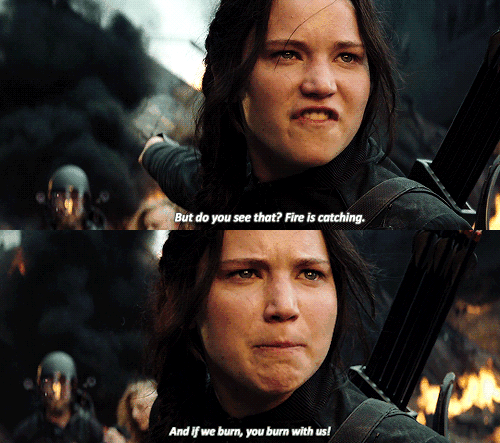
This is quite reminiscent of the character Curtis Everett, in the film Snowpiercer, who is played by Mrigashira Sun native Chris Evans. Curtis has held deep resentment for the Wilford's corrupt leadership (basically the elite people) and he is determined to lead a revolt against the elite of the front of the train. Another layer which highlights this character as Martian is his engagement in the horrible violence and chaos that ensues. The film is directed by Chitra Moon native Bong Joon Ho.

Violence is used as an equalizing force, since Mars does not moralize and acts on necessity instead. Counter-violence, in some of these films led by Martian natives, is done to balance power structures, rather than cause annihilation. Violence -> restoration.
Mars, being the warrior archetype, embodies the natural response to oppression with absolute force. So such influence will be often seen in strong, revolutionary leaders — even if they do not outright promote violence as a first resort, you will sense their Martian power. Such as the Ashwini Moon native Malcolm X, who strongly believed in self-defense, criticizing passive resistance.
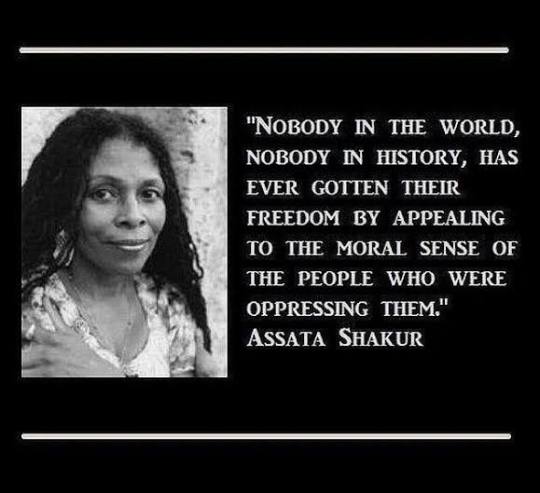
Assata Shakur has Mrigashira Moon.
It is fascinating that Kendrick Lamar, and Tupac Shakur, are considered revolutionary thinkers — both having implemented messages of resistance with their mainstream appeal. Mrigashira Sun, Chitra ASC Kendrick Lamar especially with his aggressive delivery in his album To Pimp a Butterfly, and Mrigashira Sun native Tupac Shakur whose tracks ranged from introspective/political to raw street anthems.
The restless energy in all Mars nakshatras is already responsible for pushing one forward, even to the extremes, to initiate or force change; this being something clearly seen in breaking boundaries or challenging the status quo. Mrigashira’s association with breaking free is rooted in its dual focus on exploration/seeking and self-liberation/evolution, exactly why stagnancy or oppression cannot be allowed any longer — making this a very rebellious nakshatra. This notion of Mars seeking to transcend stagnancy can extend in other themes. This restlessness is seen through sexual impulses in the Netflix series Sex/Life.
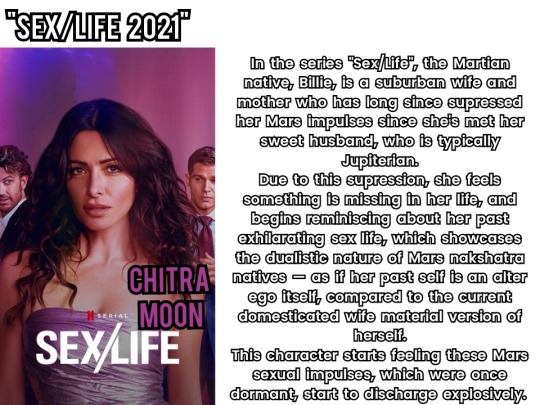
As it is known, Mars in your chart governs one's sex drive and desires. This fiery planet represents passion and attraction. Mars governs primal urges, which include carnal desire, which can be so transformative for the native — similar to the act of violence to restore balance. According to certain Puranic folklore, when Mangala (Mars) sought a consort, he was rejected by various goddesses due to his raw heat. In the series Sex/Life, Billie's primal urges are so fiery and even animalistic that the energy scares her. But she eventually has to embrace that other identity, as Mars deals with raw empowerment. Exactly why natives with this influence quite literally exude sexuality and vitality, which explains why they become sex symbols in the first place.
But Mars, as it carries tamasic and primal energy in its influence, can make people the most evil, violent and domineering if such energy is not used constructively.
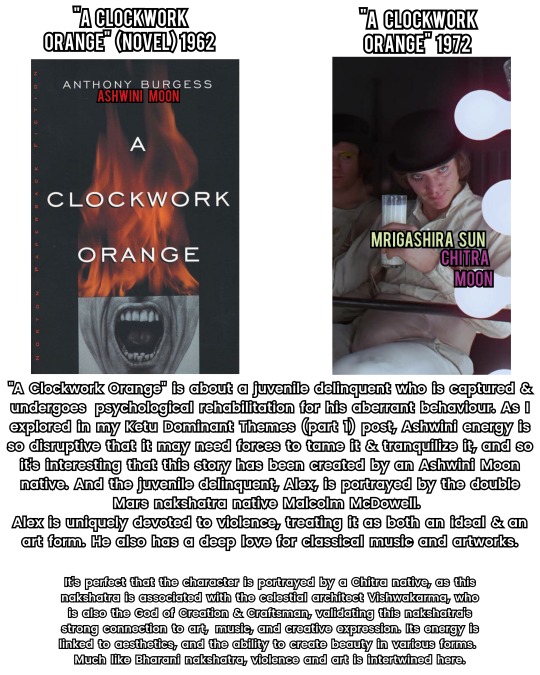
For healthier examples of Mars energy being used constructively, we can look at the film Pump Up the Volume (1990). It stars Chitra Moon Christian Slater, whose character agitates and stirs hidden impulses within the collective, bringing forth suppressed frustrations to the surface through his pirate radio station which gains a large following. His ability to ignite rawness in his listeners, encourage rebellion and self-expression, is something so very Martian. Much like Ketu, Mars can have an intense, subconscious effect on the collective – forcing people to deal with their animalistic nature in an authentic way. Christian Slater's character in Pump Up the Volume becomes the catalyst for unpredictable, at times destructive, reactions — which actually inspire growth more than anything. This film also inspired the Disney movie Radio Rebel (2012), with a similar plot, in which Dhanistha Moon Debby Ryan's character sparks a movement amongst her peers and challenges authority. This theme of being a total disruptor of the status quo or encouraging freedom from restrictive rules is a key element in all Mars influences.
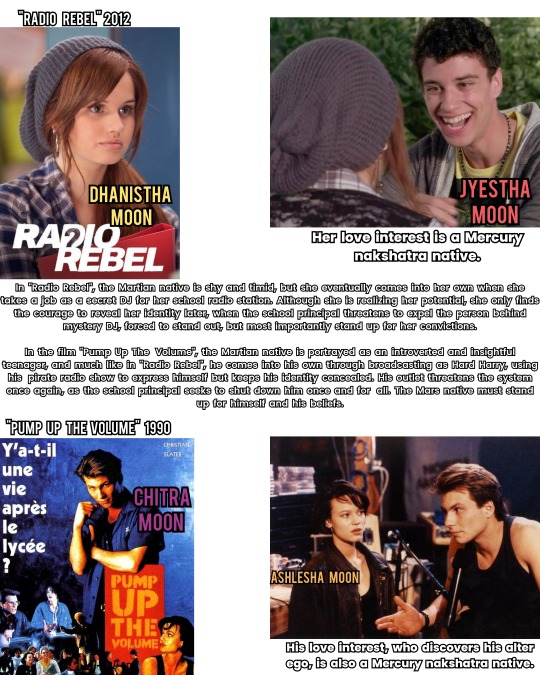
So, the core themes of all of these Mars nakshatras are self-assertion and authenticity, which indicates what is supposed to be cultivated with balancing passion and refinement (Mars pushes for transformation, after all).
This being the planet of raw energy, of impulsive action, and extreme rebellion, can reflect themes of needed chaos and animalistic drive. Both of these movies show the Martian influence behind the incite of radical shifts, often seen in controversy and the destabilization of institutions etc. You will also notice how Mercury nakshatras almost function similarly, especially Revati, the nakshatra of peak expansion, which eliminates all barriers (such as the movie V for Vendetta which is about anarchy). This further supports the constant duo between Mars and Mercury nakshatras.
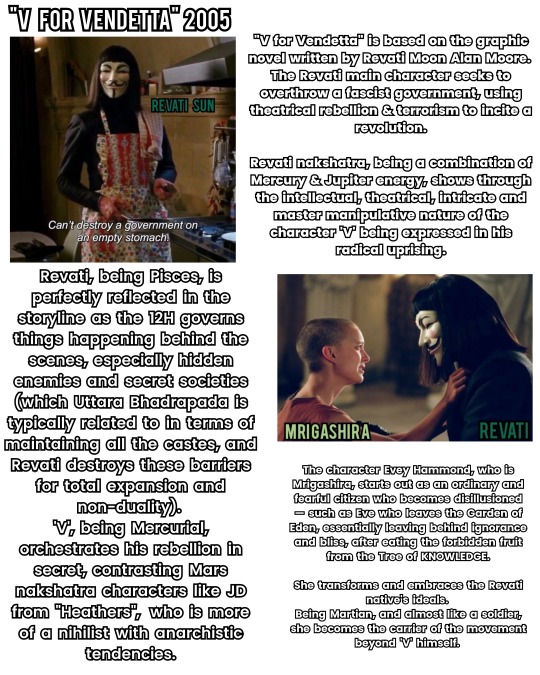
Mars being the literal planet of war, survival, and primal instinct is translated repeatedly in films about lawlessness, violent anarchy, or rebellion, where the main character, usually a Mars nakshatra native, is able to survive using brute force and wit against outward violence & chaos.
The explosive expression of Mars is so perfectly depicted in the movie Mad Max: Fury Road (2015), directed by Chitra Moon native George Miller.
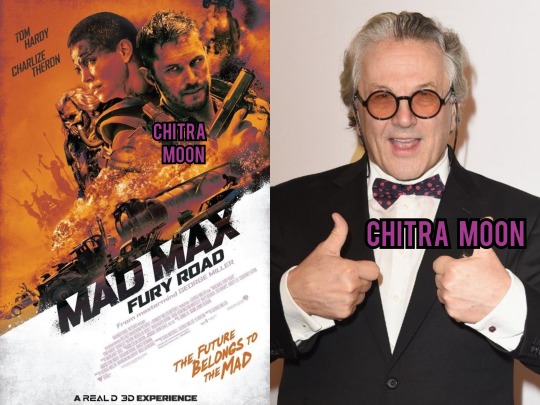
The film's primal core is survival of the fittest, implementing relentless energy in pursuit of the War Rig. And the character Max, played by Chitra Moon native Tom Hardy, represents the perseverance of Mars, able to navigate the chaos & lawlessness with pure instinct and wit — a trait common in all Mars nakshatras as they possess a level of high intelligence.

The plot of the film also includes a violent rebellion against the tyrannical warlord, and the rich cinematography supports the blend of the explosive, fiery nature of Chitra through its artistic genius. George Miller has definitely succeeded in executing his vision, as this nakshatra grants one the ability to express their grand ideas — the Mars rulership giving the native a higher success rate.
Mars nakshatra natives operating as visionaries who are, at times, self-absorbed, or even extremist, definitely points to the urgency and energetic drive which is provided by Mars. And the ability to even dream or think big is provided by the Venus and Mercury influence. The character JD from Heathers is certainly a terrible manifestation of the selfish visionary.
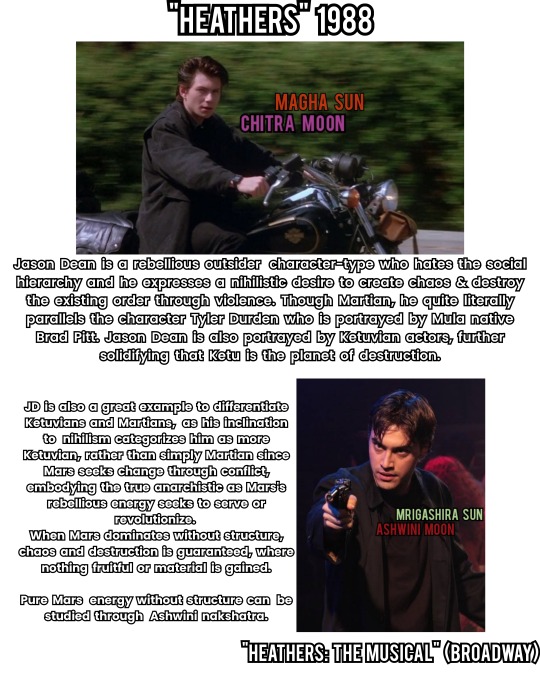
Jason Dean’s need to remake the world (even if it's through mass suicide) and his desire to tear down the oppressive social system in Heathers ties well into the visionary nature of Chitra. He wants to create a "better" world by destroying the old, his motivation making him parallel characters such as Kylo Ren, or even Ultron, in that sense.
As I've spoken of Kakegurui before (the anime & Japanese live-action), I've highlighted Mary Saotome as Martian as she has been portrayed by the Dhanistha natives, Aoi Morikawa & Minami Tanaka. Mary is the typical queen-bee of the school, caring only about maintaining her dominance over others. But then she falls from grace, and she experiences the harsh reality of being at the bottom of the hierarchy.
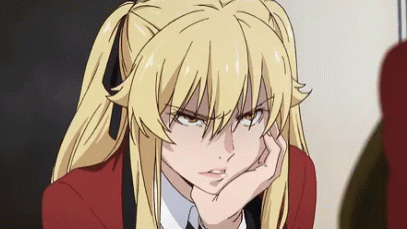
However, instead of aiming to overthrow the elite system altogether, the powerlessness she feels from being at the bottom fuels her desire to climb back up the ranks and reclaim her dominance. Usually, once the Martian has gotten some taste of power, they're unwilling to let it go. That's why you get these dualistic themes, as someone like Mary Saotome upholds hierarchal systems while someone like Jason Dean wants to destroy them. But, this may also speak to the difference between Dhanishta nakshatra and the earlier Mars nakshatras.
Dhanishta's purpose is to give one the ability to be on top of any hierarchy, which is exactly why its natives can be extremely gifted or resourceful in many things. Dhanistha would be the Mars nakshatra that is likelier to be the non-disruptor, keeping a harmonious nature within society than challenge or rebel against it for radical change, given that this nakshatra is more focused on discipline and gaining power within restrictions (and that is completely due to its Saturn rulership, making it more passive and self-controlled than its prior trine nakshatras).
So the character Mary Saotome is more calculated than violent, as her goal is not to abolish the oppressive system, but to reclaim power within it.
Kylo Ren is similar to Mary Saotome in this regard, as his goal is not to destroy the system, but to seize control of it. He doesn't care about dismantling the Sith or the First Order — he wants to rule over it. Rather than abolishing it, he embraces the Sith-Imperial power structure and works to remake it under his rule. He manipulates, schemes and positions himself to gain power, very similar to Loki, who is played by Dhanistha Sun Tom Hiddleston. Just like Loki, Kylo also has a deep need for validation and power.
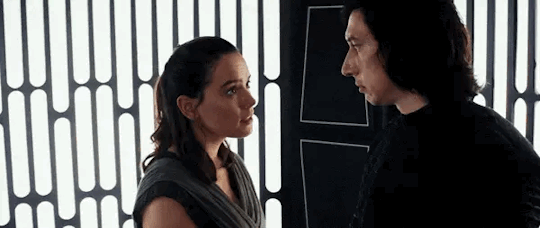
Both Jason Dean and Kylo Ren are both driven by anger, rebellion, and a desire to break free from the system — but on their own terms. Though JD believes in destruction, Kylo believes in power. These Martian natives have a singular vision which they spend the majority of the time trying to make a reality. Both of them fall in love, or form an intense connection, with a Mercury nakshatra native who start off idealistic and resistant to the Martian's radical, destructive methods. Rey is played by Revati Sun Daisy Ridley and Veronica Sawyer is played by the Jyestha Ascendant native Winona Ryder. Both Rey and Veronica are challenged to join the dark side with their Martian counterparts, as JD wants Veronica to embrace the chaos and destruction with him, while Kylo wants Rey to rule alongside him.
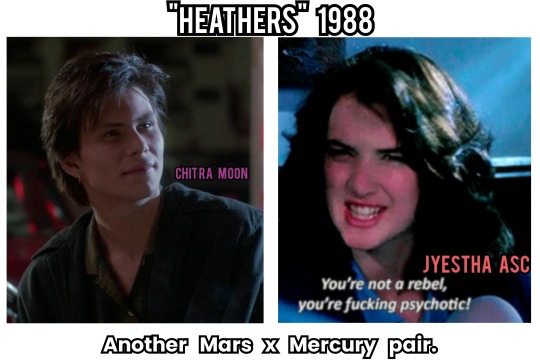
The very reason why these Mercury nakshatra natives find themselves in an interplay with Mars nakshatra natives is because of their similarities. Rey grew up abandoned and powerless, resenting the idea that worth and power was only reserved for certain bloodlines — typical of Revati nakshatra as it symbolizes the search for belonging and completion (she didn’t fit anywhere in any hierarchy, as she floated between worlds; which supports the purpose of this nakshatra to transcend beyond the material <hence why it's called the Wealthy Star, regardless of humble beginnings>, as Revati is ruled by Pushan, the shepherd deity who guides lost souls). And when Kylo voices her frustration, saying to her, "You have no place in this story," this validates her anger and loneliness, as he, too, rejects the rigid power structures that tried to control him. While Veronica despises the toxic social order of her school, where the Heathers dominate, and cruelty is rewarded (her ability to see through the illusions of popularity & power without getting sucked into the superficiality reflects Jyestha’s sharp awareness & strong resilience). JD's desire to burn it all down initially excites Veronica, only to then scare her away because his destructive, power-driven acts make him no different to the tyrants she wanted nothing to do with in the first place.
To the theme of lawlessness, the film The Purge (2013), quickly comes to mind. It is directed by James DeMonaco, who has his Sun and Moon in Chitra nakshatra, about the institutional breakdown of a government which legalizes crime for one night, encouraging unrestrained Mars energy at its purest.
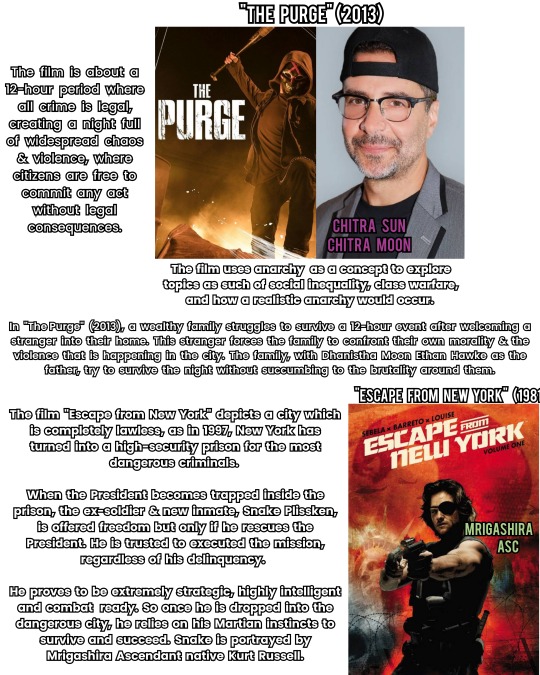
The film Escape from New York (1981) also has an aspect of lawlessness to it, as New York City is basically a prison to the most dangerous inmates ever — making it a chaotic jungle. It stars Mrigashira ASC native Kurt Russell who plays the character Snake Plissken. He embodies the combination of Mars and Gemini energy, always having a strategy and being constantly on the move. And like a Martian native, he questions authority and doesn't follow orders blindly, having a rebellious edge to him. His survivalist mentality reflects Mrigashira being a nakshatra of searching and surviving, giving one the ability to thrive in dangerous environments (the nakshatra being symbolized by the deer further signifies alertness and perception).
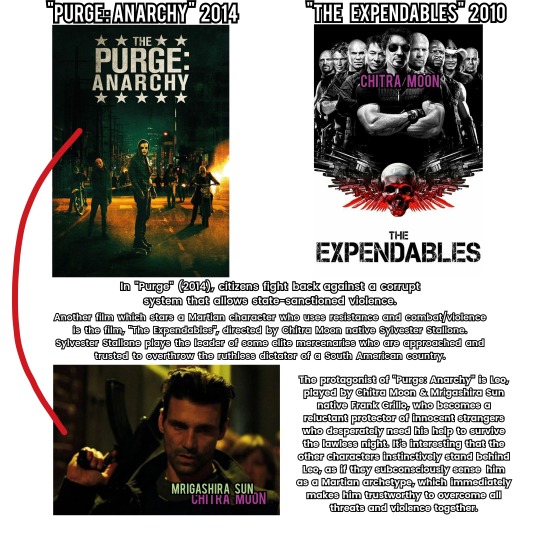
Martians also falling into warrior archetypes is the least surprising, and it's interesting that they are intuitively cast in huntress roles as well. Mrigashira is linked to tracking, making sense of the obvious connections to the genre of bounty hunting. This nakshatra literally embodies the mindset of a seeker, and due to the Mars influence, extends further to the mind of a huntress. Bounty hunters rely on strategy, intelligence, and tracking abilities to locate fugitives. Mrigashira, being ruled by Soma (Moon), which governs intuition, instinct and adaptability, supports the skillset of the bounty hunter even more.
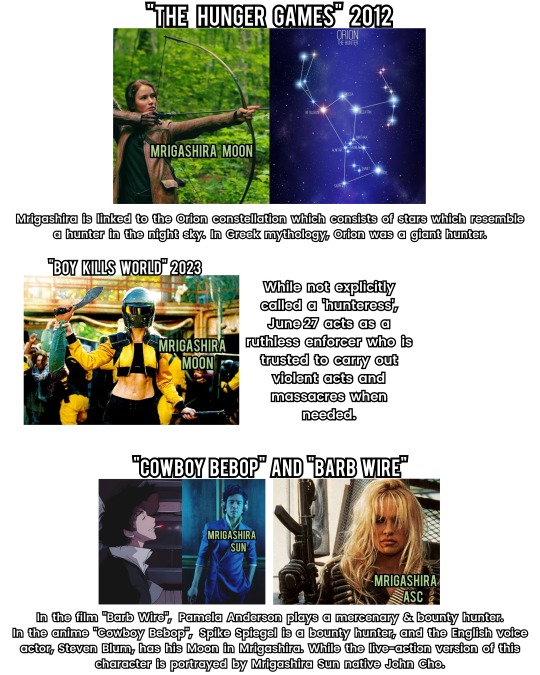
In the series The Mandalorian, Din Djarin was a bounty hunter who is portrayed by the Mrigashira ASC native Pedro Pascal. In the 1977 film A Man Called Blade, Blade is a hatchet-wielding bounty hunter with a dark past who is played by the Dhanistha Sun & Moon native Maurizio Merli. In Star Wars, Boba Fett is regarded as one of the most fearsome and capable bounty hunters, and he was played by Dhanistha Sun Jeremy Bulloch.
The Mars nakshatras being in both Earth and Air rashi sections points to the importance of structure vs fluidity, suggesting that Mars is mastering both the physical and mental battlefields. The whole mastermind archetype perfectly aligns with these nakshatras, specifically Mrigashira, the nakshatra of the eternal quest for knowledge.
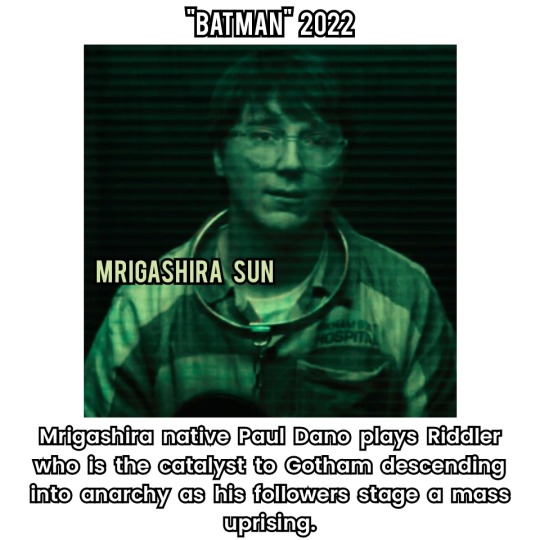
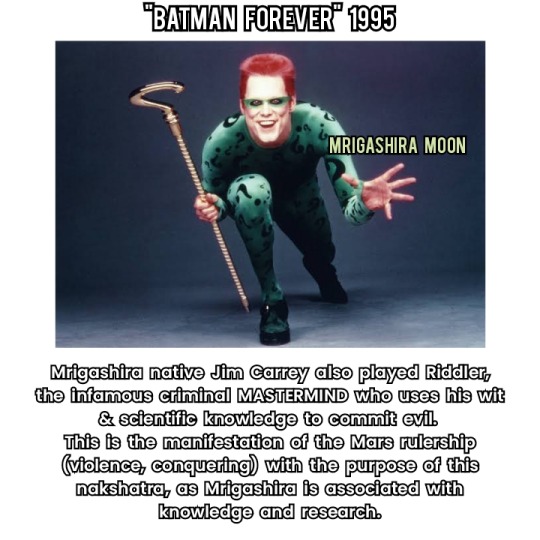
The strategy of Mars, the creativity of Venus (Libra/Taurus), and the craftiness of Mercury (Gemini/Virgo), can make for a theatrical trickster, instigator or mastermind, as seen with the character the Riddler.
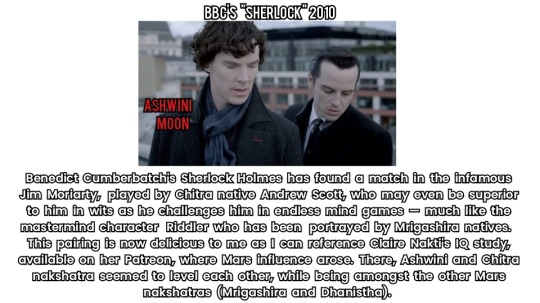
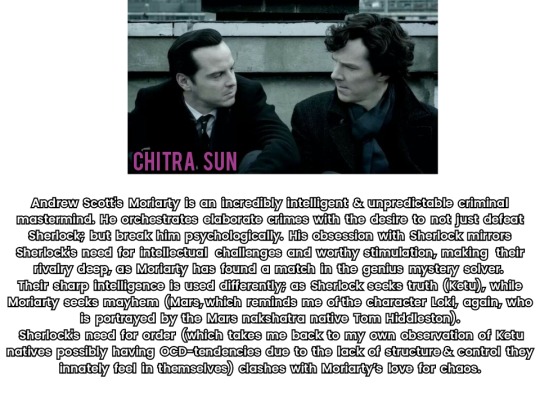
As Mars is associated with the head, since it is co-ruling Aries (and the head is more emphasized in Ashwini nakshatra, symbolized by a horse's head which signifies qualities of swiftness such as quick wit); this means that Mars drives intellect, providing one the energy to slice through life with strategy and dominance with accumulated knowledge to defeat opponents, giving one the gift in noticing details that nobody else would (this ability often arises when an individual is on survival-mode, further showing how Mars, being associated with survival of the fittest, makes its natives have a keen sense of awareness). This is exactly why Mars nakshatras are often found in medias that have to do with solving mysteries.
Miss Marple is literally the original female detective. She is an elderly amateur, consulting detective who has been prominently played by Mars nakshatra natives. Throughout many film adaptions, she has been portrayed by the following actresses; Chitra ASC Gracie Fields, Chitra Suns Angela Lansbury and Helen Hayes, Chitra Moon Geraldine McEwan, Dhanistha Moon Joan Hickson, Dhanistha Sun Julia McKenzie. In the series DI Ray, Chitra Moon Parminder Nagra plays a Birmingham-based detective. In the series The Fall, Dhanistha Moon Gillian Anderson is a sharp, determined detective. It reminds me of the relentless detective in the Spanish series Berlin, played by Dhanistha Sun & Moon native Najwa Nimri. Though you'll see Ketu nakshatra natives take up this genre as well, it seems to be dominated by Mars influence. In the film Silence of the Lambs, Magha Moon Jodie Foster plays detective Sterling who is the fixation of a terrifying serial killer; in Hannibal, Jodie Foster is replaced by the Mrigashira Moon & ASC native Julianne Moore, continuing the story as detective Sterling who finds herself in what you'd consider a dark romance, or game of prey-&-predator, with Hannibal (which has to do with Mrigashira nakshatra, in general, more than it just being a Mars nakshatra).
So high IQ, beauty, mass appeal, and dominance can be a full package when it comes to Mars nakshatras. Each Mars nakshatra may provide one with a gift to expand one into elite rooms or into higher positions of power.
Dhanishta nakshatra possesses Khyapayitri Shakti, which is the power to bring fame and abundance. Mrigashira nakshatra, with its seeking nature, is powered by Prinana Shakti, which gives fulfillment. Chitra nakshatra, ruled by Tvashtar, who is the cosmic craftsman, has the ability to accumulate good merit in life from being powered by the Punya Chayani Shakti.
As Dhanistha is associated with rhythm & performance, Mrigashira being partially ruled by Venus, and Chitra's deity, Tvashtar, being the god of artisans and fashioning, it comes as no surprise that these nakshatras are prominently found in the art, entertainment, and fashion industry or in celebrity culture in general. Often the faces of the glitz and glamour.

Chitra especially, since it signifies beauty, meticulousness and expressing imagination on the material plane. Chitra is literally the nakshatra of the visionary.
The Disney princesses I'd confidently associate with Chitra are Moana and Ariel. As this nakshatra is symbolized by the pearl, it points to the pursuit of brilliance. And like the pearl hidden in the ocean, their path involves venturing the unknown, seeking newfound radiance or, similar to Mrigashira, finally capturing the higher power they've always been seeking — showing just how these natives are deeply aligned to fate. Mars provides these characters with enough enthusiasm and restlessness to fulfill that destiny.
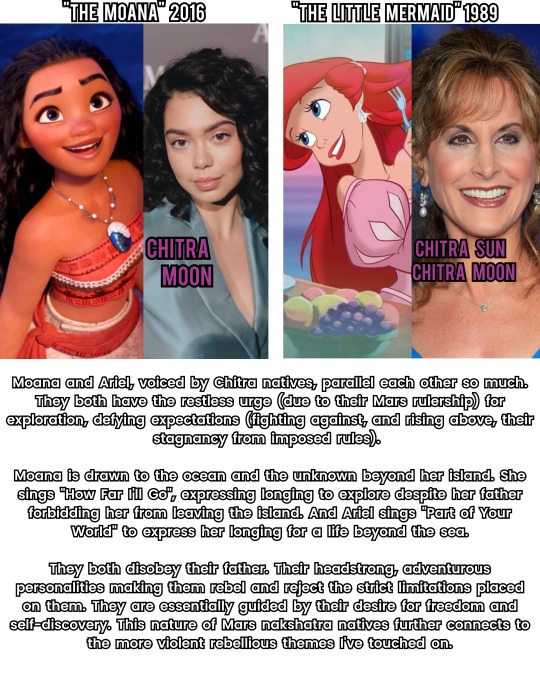
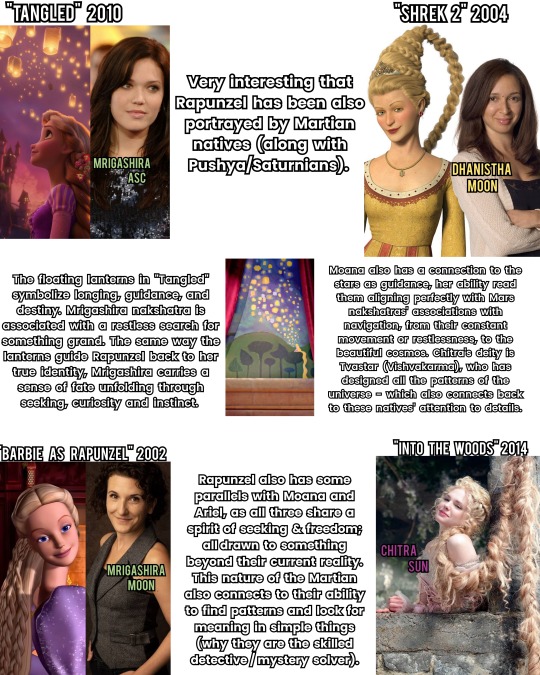
Mrigashira, Chitra, and Dhanistha each embody core themes which have to do with the relentless pursuit of fulfilment, whether it be alignment with one's true identity (such as through Mrigashira's trope of memory loss, or Rapunzel retracing her true roots), or knowledge, mastery, status/validation, or freedom. All three nakshatras make individuals challenge their own limitations, as they are a force of growth themselves. This falls perfectly well into the warrior archetype which defies hierarchy and reshapes their reality through strategy, ambition, rebellion, and even violence.
All of this just to say, they have the power of INFLUENCE and IMMENSE GROWTH.
#vedic astrology#astrology#sidereal astrology#mars#mrigashira#chitra#dhanistha#taurus#gemini#libra#virgo#capricorn#aquarius#astro observations#sidereal observations#astrology observations#vedic observations#nakshatra series#jyestha#revati#ashwini#ashlesha#mercury#pisces
204 notes
·
View notes
Text
What is Bucky's motivation for running for Congress, genuinely? It's so out of left field I'm worried they're not going to give a sufficient explanation in thunderbolts. He's experienced some pretty terrible shit at the hands of the U.S. government in the past, and I could understand someone else in his shoes wanting to make a difference in the political sphere because of that, but this is Bucky we're talking about. He hates being in the public eye. He breaks the law several times in FATWS without regret (not that that would stop any politicians in reality from gaining power, *cough cough*, but this is fiction we're talking about), and appears utterly disinterested in engaging with the bureaucracy. He's at his happiest hanging out with Sam and his family - what on earth would motivate him to jump into politics as soon as he's starting to heal mentally? He is definitely a people person, so I could see him becoming some kind of liason in the future, but the environment of big-ticket politics seems like it would mesh SO poorly with his personality.
He could be backsliding? Maybe this is his new way of making "amends"? Except that in the Thunderbolts trailer, it's pretty obvious that he's supposed to be the "mature, seasoned character that keeps the others in check" and it seems that he's gotten past the guilt that drove his actions in FATWS and beforehand.
Maybe he's bored of fighting and wants to make a difference in a different way than he's used to? But he has never indicated any desire to become a politician in the past. Like, not even a hint. I can read into the MCU all I want and I still don't see any hints that this is a career path he's remotely interested in.
Of course there's always a chance that it's a cover, but why would he go through the trouble of running for office in that case? Why wouldn't he just...I don't know...take someone else's place? Pretend to be a bodyguard or something? Financing an entire campaign would be a very roundabout way to build a cover for yourself, but hey, I don't know what's happened between FATWS and Thunderbolts. Maybe that'd be necessary for some reason.
All of that being said, I'm just begging Marvel for some consistency here. I have pretty high hopes for thunderbolts despite all my complaints and I'm really hoping they don't just explain away the whole Congress thing.
81 notes
·
View notes
Note
Do you have an HP character that you hate or dislike other than Ginny? I'm curious because you seem kind of neutral toward most characters, so I was wondering if you have one
Yep, a bunch.
Some more controversial than others I guess.
I do want to preface this by saying that I have nothing against anyone who likes any of these characters, liking a fictional character is pretty subjective and I don't really care. I would also like to note there are different ways to like/dislike a fictional character.
1. Due to their personality or morals, i.e. who they are as a person
2. Due to how they are written, i.e. if they function well in their part in the narrative.
As such, there could be characters that are horrible people but are fun and interesting characters, so I love them (such as Voldemort) or characters that are good people who I dislike because I think they're badly written or underwhelming in how they are written compared to what they could've been. Similarly, there are badly written characters I like because they are fun or dislike because I don't vibe with them. So, all this shouldn't be taken all that seriously.
While Ginny definitely has aspects in her personality that I don't like, the main reason I dislike her is how she is written. I like meaner and ruder characters than her because they are interesting and serve their narrative rule well. I consider her a badly written love interest though, so my dislike of her on both fronts, but mostly due to the second category that feeds into the first one. The idea of Ginny could've been alright if she was written better, I wouldn't even care that much if she was mean if she was a more interesting character that felt like a real person (Like Hermione or Harry that have their mean moments, but I love Harry and like Hermione).
Now, onto other characters I dislike from commonly disliked by the fandom to controversial takes:
1. There are typical ones to dislike, like Umbridge, whom I despise as a person, and everything she represents but she's a great villain who serves her role in the narrative brilliantly. She's on this list because I don't find her interesting enough (like Voldemort or Bellatrix) or fun enough (like Rita Skeeter) to like her as a character.
2 & 3. Vernon and Petunia. For obvious reasons I expanded upon here. They are another example of characters you are meant to hate so they are written well for what they need to be. (Though I don't hate Dudley who's also a character you are meant to dislike)
4. Crouch Sr. I don't think this is controversial at all, but Crouch Sr is a git. I mean, sentencing Sirius to Azkaban without trial, everything with his son (even if he was a Death Eater, 12 years in a basement under the Imperius is extreme and Barty probably wished to die), Winkey, etc. So, personality-wise, he sucks. Writing-wise, I think he's great for what he is meant to be in the story. JKR is pretty good at writing characters you just hate the moment they open their mouths and Crouch Sr is one of them.
5. Amos Diggory. He is another member of the "characters you are meant to hate club", so I hate him as a person, which is kind of the point with him. And the only explanation is this entire conversation:
“Harry fell off his broom, Dad,” he muttered. “I told you . . . it was an accident. . . .” “Yes, but you didn’t fall off, did you?” roared Amos genially, slapping his son on his back. “Always modest, our Ced, always the gentleman . . . but the best man won, I’m sure Harry’d say the same, wouldn’t you, eh? One falls off his broom, one stays on, you don’t need to be a genius to tell which one’s the better flier!”
(GoF, Ch6)
Made my blood boil.
6. Fudge is another typical one, but like, I hate that guy's guts. Again, it's because I hate him as a person. As a character, he is what he needs to be, so I have no complaints about how he is written. Being a pathetic, incompetent fool is part of his narrative role. (Again, a character you are meant to hate).
7. Quick round for honorary mentions of the characters you are meant to hate club I dislike that I am not as passionate about my dislike of them but I still actively dislike them: Cormac McLaggen, Marietta Edgecomb, Rufus Scrimgeour, Mundungus, the Carrows.
(Zacharias Smith and Blaise Zabini are also part of the above club, but I love them, so they're not on the list. Fenrir, Rita, and Ludo Bagman aren't on the list because I find them entertaining although the reader is supposed to dislike them. Filch is a useful character and has his fun moments as well, so I'm fine with him. I also like random DE Avery because I like his name)
8. I'm weird about Albus Dumbledore. I think he's an interesting character, though I have some gripes with how he was written, and I would find him infuriating as a person. If I had to talk with Dumbledore irl, I'd have to fight the urge to strangle him (not that I actually would, or could since he's really tall and I doubt I could reach his throat). I understand Tom completely when it comes to wanting to kill Dumbledore.
9. Arabella Figg. Rubs me the wrong way and I don't like her as a person. It might be due to the writing but I never cared enough to analyze my feelings toward her — which are negative. I mean, she didn't do shit to help Harry even though she knew and was in touch with Dumbledore + didn't help him at all with carrying Dudley which would've been in her best interest since it'll get them back to the Dursleys quicker. So, I think she's not a great person who doesn't really care about Harry or is very ignorant and passive — when I need to question whether a character is malicious or incompetent it's not a good thing when the character is supposed to be one of the good guys.
10. Alaster Moody (the real one). I don't think this is a common opinion, but I really don't like the real Moody both as a person and as a character. Writing-wise, he's a little blander than I'd expect from someone like him. Also, after Barty acts him as such a fun character, meeting the real one is kind of a letdown since he isn't as inspirational and fun as the imposter (this is how I figured out I just like Barty Crouch Jr). This is a writing flaw, I think, since you are supposed to like Moody. I think. Personality-wise, I don't like him. He rubbed me off the wrong way, I hate his complete trust and devotion toward Dumbledore, his opinions and treatment of Harry, and his general incompetence:
“Come here, boy,” said Moody gruffly, beckoning Harry toward him with his wand. “I need to Disillusion you.”
(OotP, Ch3) - sounds too much like Vernon for my liking
“Clear night,” grunted Moody, his magical eye scanning the heavens. “Could’ve done with a bit more cloud cover. Right, you,” he barked at Harry, “we’re going to be flying in close formation.
(OotP, Ch3) - an experienced, intelligent auror would not come up with this plan or think this plan is valid. He is a moron and for some reason not treated as such. At least Kingsley has some good ideas throughout the books and shows he's competent, Moody has close to zero competent moments. I think that's a writing flaw though.
“Yeah, well,” said Moody, “there’s something funny about the Potter kid, we all know that.”
(OotP, Ch22) - I do not like the Harry slander. While Moody does things to protect and help Harry (because Dumbledore told him to) I don't think he actually likes Harry much.
11. This is not a very popular opinion, I think, but I don't like Lupin. In both categories. Personality-wise, he's allergic to responsibility and never actually tries to bond with Harry, going out of his way to not mention he was friends with James. He is so stuck in indecision that he allows Sirius, who he thinks is a serial killer to enter the school. And he attempts to run away from his pregnant wife. Writing-wise, I like the concept of Lupin, not the execution. How he is makes sense for what we know about his life, but I find him underwhelming as a character. Mostly, I find him disappointing since he is less interesting of a character than I think he could've been.
(Peter is not on this list as I have no complaints about how he was written for his role in the story. Also, unlike Remus, I didn't expect better from Peter. I was ready to be disappointed by him and he positively surprised me by having a better character arc than Remus. I dislike Remus because I had higher expectations from him and his narrative arc)
Also, this quote from Remus really soured his character for me, which I was indifferent towards until OotP:
Harry, I’ve left a letter telling your aunt and uncle not to worry —” “They won’t,” said Harry. “That you’re safe —” “That’ll just depress them.” “— and you’ll see them next summer.” “Do I have to?” Lupin smiled but made no answer.
(OotP, Ch3)
(I have other characters I find annoying such as Draco, Trelawney, or Colin Creevey, characters I don't really vibe with such as Ollivanders or Pansy, and characters I find dull such as Crabbe and Goyle but I don't actively dislike them enough, like, I'm mostly indifferent to mildly annoyed by them, so they don't count).
#harry potter#hp#asks#anonymous#hollowedrambling#dolores umbridge#cornelius fudge#remus lupin critical#albus dumbledore critical#mad eye moody critical#the dursleys#arabella figg critical#a bunch of other characters but they're pretty minor
57 notes
·
View notes
Text
I mean, Legend of Lattes did have a conflict, her coffee place straight up burned down? It wasn't a major focus for most of the book but it happened.
I've only read a few cozy fantasy things, and didn't find a few of them super memorable myself, but the definition of cozy fantasy is pretty broad from what I've seen. Emily Wilde is categorized as that and it is FULL of conflict and action and has some great and memorable characters.
But people have always liked stuff that's low tension/stakes/fluffy. See coffee shop aus in fanfic, or fanfic tagged fluff. See slice of life anime where characters are just hanging out. It's not a new thing. People have always wanted to watch or read things that just give cozy vibes and allow them to hang out with characters. The book industry realizing there was a market for that was inevitable. If it's not for you, it's not for you, but it's obviously for someone or it wouldn't be doing well.
I also think this is a good example of how condescending we can get when talking about a genre we don't like. Rather than say "it's not for me, I don't find the characters memorable and want better stakes, maybe there should be more variety" (which was more where OP was at) it has to be somehow bad for people to read it and write it. like...
And so sometimes it feels impossibly challenging to write any book except one where nothing bad happens and nothing is in danger and nobody is really bothered or worried about anything and everything is mostly fine and there aren't any major setbacks…..
That is a hell of a condescending assumption to make about those writers. Jesus. I'm a professional author too, but I would not want to make these assumptions about my fellow writers.You don't know if they're doing it because it's easy, or if they're doing it because they felt there was a need for it, or it was just an idea they liked writing. You don't like it, great. That doesn't mean those writers are slacking off or doing something wrong somehow. You don't know that they don't also write books with tension and conflict. I feel like most of them probably have, actually. Assuming they sat down and thought "omg this will be easy I'm so lazy" is just...do you make the same assumption about romance writers? It can get pretty formulaic, but that doesn't mean it's easy to write. Have you tried to write a cozy fantasy and sell it and make it do well? If not, I don't think you should talk about how easy it is.
But that leaves readers cold.
I mean not all readers obviously, since it wouldn't be doing well or selling well?
And frankly, I don't feel like it does much of anything to nourish either our souls or theirs.
It feels like eating a bag of potato chips for dinner instead of going to the effort of even just heating up a frozen dinner that has a vegetable in it.
Why does reading HAVE to "nourish your soul", whatever that means? What's wrong with eating a bag of potato chips? You teach college, so I wonder if you've ever run into a colleague who thinks this way about regular fantasy and sci-fi. Where they think that genre fiction is inherently more disposable and less challenging than literary fiction. I've sure as hell run into those professors, that look down on readers and writers of "commercial fiction", and I've seen the bad impact they have on their students. Do you agree with them? Because you're sounding a lot like them right now. This is the exactly the kind of argument they'd make.
You don't know whether these people don't also read books with more stakes or a variety of genres as well. Low effort reading has it's place, it just maybe shouldn't be the only thing you read if you want to actually experience the breadth of literature.
And I see this a lot in the book community, but dissing the stuff people are into and saying they need to challenge themselves more or they won't be smart like you (I see this with YA a lot too) is not going to convince them. It frames reading as a chore, and people often don't like doing chores in a life full of them, and reading is a hobby for a lot of people. Rather that say "you need to read this to better your mind" say what can be interesting or intriguing about these books that are more challenging, what kind of cool things you can get from them. Sometimes it seems to me like the point of these arguments is to feel superior, rather than actually convince people.
Nothing's wrong with reading low effort books or watch low effort shows--it's when say, a YA reader says books are inherently flawed if they don't spell things out like YA sometimes does or has more challenging themes. Or a cozy fantasy reader acting like all books should be cozy fantasy and books with tension are bad. Those are the people that ruin the discourse. But, doing the inverse isn't any better.
idk, man. I've taught university classes about this shit, but what do I know.
I teach grad school classes on writing, (I don't like to pull that card, since it's not like teachers can't have flawed ideas about their subject but since we're here) and have taught similar lessons. Yet, here's what I think I do know: telling students the genre they write is wrong is not something a teacher should do. Those literary fiction professors love doing that, and I'm not them.
As a teacher with a variety of students in a variety of genres, I have to read genres I don't like all the time--god I hate most 'dark romance' and man do I not get or like omegaverse, but I sure as hell had to read both. But just because I don't like them doesn't mean they're worthless, or there isn't a market for them, or it's wrong to write them. So I put those feelings aside, think about what kind of help the student needs to be successful in their chosen genre, and what the audience would want, because that will help them improve. (though I do try to hint if something seems like, incredibly sexist, that maybe we should reconsider that, or look at it from all angles and decide if it's something the story needs). And at the same time, I do teach them basic lessons on how to structure a story, and what's good about conflict, stakes, etc.
But I wouldn't tell any of them they're wrong for writing cozy fantasy even if it's not always my cup of tea, because there is a market for it, and I want them to do well at it and do what they love. What pays the bills pays them, and if you actually like what you do, that's also important. Writers do need to challenge themselves, which is why I encourage students to be open minded about all genres, try out writing them, try writing different POVs, different stuff even if they don't publish it, because that can only help them get better at what they do. But if what they publish is cozy fantasy, hey, it gets them good money and they like doing it, that's more than I can say for most jobs.
Cozy Fantasy and Why It Doesn't Work
I think I am among many who feel like they should love cozy fantasy and have found it an incredibly lacking genre.
This newly branded "cozy fantasy" genre that has taken readers by storm since 2020 and while it is new that books are now marketed as cozy, the genre itself isn't new. Howl's Moving Castle by Diana Wynne Jones is a great example of the genre before it was labeled and also how to make it work.
Cozy fantasy is defined by many as fantasy with low stakes. Fantasy aesthetic but less sword fights. On paper, it sounds great. But the execution has been less than stellar for readers like me. The lack of physical stakes has also impacted the emotional stakes of these books, creating forgettable characters with boring problems. As a romance reader, I find this frustrating. Romance is known for being a predictable and formulaic genre, the now defunct Romance Writers of America defined romances as needing happy endings, a term romances have continued to follow. Yet these romance texts manage to have low physical stakes (how to date your neighbor, how to confront your toxic friends, etc) while still maintaining high personal stakes that keep readers invested and begging for more. So I was initially confused why cozy fantasy authors struggle to write texts that connect to readers like me.
I think I have found the answer which is the genre is just here for vibes. It is all about aesthetic, not even worldbuilding that fantasy is known for as most cozy fantasy I read have so many problems as soon as you ask one question. It is hard to acknowledge that a genre that is pitched to work for readers like me doesn't work for many of us. Especially because occasionally there is one that works beautifully to my taste.
I often say my favorite cozy fantasies that are more contemporary are short and visual, which I plays into the idea of the genre being an aesthetic. The Bakery Dragon by Devin Elle Kurtz is a good example because it is a simple story that is given the perfect amount of pages and gorgeous visuals without dragging on when the message is very clear and easy to understand. Books like The Phoenix Keeper and Legends and Lattes have absolutely nothing for me, their very clear message hitting the reader over and over so the readers don't miss it and focusing on the aesthetic of worldbuilding rather than the reality of the fantastic elements within the world.
I guess my point is. . . I realize this genre isn't for me since I have realized it is more of an aesthetic than anything. .. .but I want it to be. Should I let it go and put my efforts elsewhere? Or should I keep exploring this new trend and find the hidden gems?
#writing#book talk#sorry...sometimes the tone of a thing gets to me even if i also don't care for the subject
6K notes
·
View notes
Text
Black History Month Author Spotlight: Kiki

Our third edition of the Black History Month Author Spotlight series, features Kiki (@scapegoated-if)!
(I’m rly happy to have gotten to know Kiki better through the feature, and the interview contains really interesting insights on gender and race-locked main characters in interactive fiction, among other things! If you haven’t yet played Scapegoated (and if you’re a fan of Infamous/music IFs, definitely give it a go!)
Author: Kiki Born and raised North London, but ethnic background Jamaican (my parents are a part of the Windrush Gen)
Games: Scapegoated (slice-of-life, music, hollywood, '70s)
Short blurb: Scapegoated is about a female musician in a band that is seguing into an acting career. She is facing a lot of blame and scandal regarding the split between her band that happened in 1968. Not only are a lot of the general public hurt and angry about it, but so is an infamous serial killer that has been terrorising the west coast...
Quotes from the interview
I’m from North London. My parents moved to London when they were children from the Caribbean and are a part of the Windrush generation. I am a black, bisexual woman growing up in the UK, a place that tends to disguise its wider prejudices as a classist issue in all cases. […] A huge part of my love for music is strongly intertwined with my relationship with my late father. He passed away in June of 2023, and he was very much so kickin’ it in the ‘70s. He was a DJ throughout his life, so the legacy of LPs that he left behind was unspeakable and very ‘70s.
Read on for the full interview!

Tell me more about yourself! What are some things new readers or long-time readers might not know about you?
I graduated from a Russell Group university with an English Literature BA (Hons). I think a part of me has always wanted to be a writer in some capacity; I know that I’ve always wanted to write a book. So, I think beginning this IF has existed for me as a gateway to see what that would be like. I thought of it as a brainteaser–the prospect of exploring different outcomes and different pathways that a character may undertake. It has been challenging, dare I say more challenging than writing an actual book, but that’s exactly what I wanted out of this process.
Can you tell me a bit about what you’re working on right now and your journey into interactive fiction? What inspired the game/story you’re currently writing?
My best friend introduced me to the world of interactive fiction one day last year. She introduced Infamous to me and asserted that I would really like it because I’m a huge music nerd. Of course I fell in love with the characters and the world, but I also fell in love with the format of IFs.
A huge part of my love for music is strongly intertwined with my relationship with my late father. He passed away in June of 2023, and he was very much so kickin’ it in the ‘70s. He was a DJ throughout his life, so the legacy of LPs that he left behind was unspeakable and very ‘70s. I am a huge music lover with such a wide-spanning eclectic taste, but the period of music post-”Dylan going electric”, post-”Elvis being on the out”, Quincy Jones (rest in king) and Beatlemania is just everything to me, so the idea for Scapegoated came into my life in a very natural way. I knew that whichever story I told, I wanted it to explore the Sunset Strip, groupies, rock ‘n roll, The Beatles, The Manson Family and Cher all at its core.
I am of the opinion that coverage of the ‘70s music scene has been run into the ground lately. There has been a resurgence of nostalgia within the public consciousness when reflecting upon this time due to Daisy Jones & The Six, which was one of my favourite shows the year it was released. So, including Hollywood and murder was my attempt at innovation.

How has your identity, heritage/background, upbringing, or personal experiences influenced your storytelling or writing process? OR How does your work feature aspects of your identity / experience?
I’m from North London. My parents moved to London when they were children from the Caribbean and are a part of the Windrush generation. I am a black, bisexual woman growing up in the UK, a place that tends to disguise its wider prejudices as a classist issue in all cases. I am writing Scapegoated as someone that has only been to the US twice for two weeks at a time. I am writing Scapegoated as someone that can only relate to two aspects of my main character. I am writing Scapegoated as someone that has experienced discrimination and has been scarred by instances of discrimination. In university, I tended to be quite outspoken; in my first year, I felt quite ostracised by my predominantly white cohort during the BLM movement, because I seemed to be the only one willing to speak out in favour of it.
When I first wrote Scapegoated, I was inboxed on Tumblr and replied to on the Choice of Games Forum with genuine curiosity about my choice to gender and race lock my protagonist. This is an excerpt of my response:
I didn’t want to have a self-insert MC because I wanted to ensure that the conversations had revolving these social issues and the murders that unfold aren’t danced around. Perspective is an extremely important factor in that, and I want to ensure that the MC is directly involved–rather than just there as things happen because it wouldn’t be interactive. [...] Initially when I planned this story, before it was titled and the only thing I knew was that I wanted to write an IF about the '70s music scene, it was neither gender or race locked [...]. But I did toy with my ideas by self-inserting (I’m a black woman) when I was attempting to figure out the logistics of gameplay. That’s when I realised that due to the time period and all of the change that was happening at the time, social issues had to be discussed.
To this day, I am extremely proud of my decision and the conviction in my decision. I asserted a level of loyalty to the story I am telling in a way that I didn’t know I was capable of; retrospectively, I think I took a kind of power in it. But I really love the story I am telling and the range of representation.
I am trying to work the line of prioritising my vision, all the while giving weight and importance to my readers’ opinions in the way that these very interesting and thorough opinions deserve. It warms my heart that even one person might care about my characters just as much as I do.
what are some of the most rewarding or challenging aspects of writing Interactive Fiction for you?
Songwriting. I’m tragic at it, but I like to think I’m self-aware enough. There are different characters with different voices and different reasonings behind their songwriting styles. I struggle to ensure that their songwriting oozes with their individual personalities.
What does your writing process look like? Any rituals or habits? Any tips, tricks, philosophies or approaches that have worked very well for you?
Story beats. However, planning and writing can exist as two entirely different realms to me. What I think the story may be, can develop into something entirely new all on its own once I begin to write. Sometimes characters that I think I know transform into someone entirely new once I start to get to know them through writing their dialogue. I’ve experienced this with several characters already. On the contrary, some characters are so secure in my mind that they can’t be anything other than who I’ve introduced them to myself as.
I really love the writing process I’ve conjured up. It hasn’t failed me yet, but it isn’t secure–writing can never be anything other than an insecure process. Writing, for me, always remains in a constant stage of planning.

Do you have favourite interactive fiction games, characters, scenes or authors that you’d like to recommend?
I have received a lot of IF recommendations due to how new I am to IFs. I truly haven’t read very many, so all I can recommend to anybody are the 3 IFs that I have read which I each loved enormously: Infamous; College Tennis: Origin Story; and Apartment 502.
If you were to say one thing to your readers, other authors, and/or the interactive fiction community: what would it be?
I only got here in December, and so far everyone has been extremely welcoming and helpful. Honestly, I have no notes. All I can do is encourage everyone to give writing a chance. It’s been so fruitful and rewarding for me, so I strongly urge everyone to give it a shot if you’re considering it. Stop thinking, just do!
Any books, music, movies etc. you’re obsessed with at the moment, or which changed your life (or perspectives on something)?
I’m currently reading I’m With The Band by Pamela Des Barres as research for my IF, which has been a great insight into the mindset of groupies on an intimate level.
As for something that changed my life, I recently watched Sing Sing (2024)--which wasn’t something I did in relation to Scapegoated, I am just an avid film-watcher–and it was such an incredible de-stigmatising eye into the prison system. An extremely important watch for Black History Month, too!
This-or-that segment: (bold = Kiki's pick)
Coffee or tea?
Early mornings or late nights?
City or countryside?
Angsty or Cozy romances? (Or enemies-to-lovers or best-friends-to-lovers?)
Steady progress or frenzied binge-writing followed by periods of calm?
Summer or Winter?
First drafts or editing?
Introvert or extrovert?
Plotter or pantser?
Characters or plot first?
Kiki’s custom “either-or” pairing: writing in silence or with music playing?
#interactive fiction#cscript game#interactive games#author features#black history month#interview feature#spotlight#poc game developers
80 notes
·
View notes
Text
why aren't you reading seek?
but for real though, today's chapter was so damn good it motivated me to at least try to write recommendation. i need more people to read it - someone who follows me has got to be willing to give it a try
seek is an original science fiction story set in the radically distant future, updating roughly every week (or lately, closer to every two)
the world is barely recognizable, practically post-scarcity and full of cybernetic modification and AI
in fact, one of the pov characters is one such AI, and the other is so heavily modded i've seen one person derisively call her a cyberfox. this hardly scratched the surface of what's interesting about them and their situation, but this is just a quick recommendation
you can read the first chapter here: https://seekwebserial.wordpress.com/2024/10/18/0-1-0-hack/
i'll admit, the start can be a bit shaky (this whole "guy wakes up in a hostile high-tech facility with no memory of what's going on" setup is definitely not the most inspired of starts, and this is all the more dubious when it's so far still unclear what role he'll play in the long run direction of the story)
furthermore, the structure of Seek is ambitious - and questionable in a way that strains against the foremost issue of a rotating pov stories. there are three perspective characters, each essentially living in entirely different worlds and "eras".
as a result, it feels at times like reading three different novels interleaved, with little tying them together. now, a sense of interconnection has begun to emerge, a dozen odd chapters down the line, but yeah
if you stick with it, though? there's incredible payoff, several intensely satisfying character moments in a fascintating world futuristic to the point of becoming alien
the blurb goes:
Despite our best efforts, few survived faster than light travel. None survived the trip back. So we took a different approach altogether. We started bringing the universe to us. There’s no point. What hasn’t changed in the last four hundred years won’t change in our lifetimes. There’s no point. We’ve solved it. Everything humanity needs, it has. We’ve reached the finish line. There’s no point. Turn off the lights, close your eyes, and cover your ears, nightmares come manifest. Three storylines from three individuals, worlds and eras apart.
as i try to write this recommendation, i'm finding myself trying to summarize all the cool things it does - how society and culture is reshaped by this abundance of resources and automation, and the gross proliferation of advertisement and surveillance that results. or talk about the emphasis the cybernetic augmented place on the fidelity of their mods. but at a point it feels like i'm just doing a worse job of telling the story
so i think the one thing i'd point to as my favorite part of Seek is its portrayal of the integrated "onboard" AI that quickly become more widespread over the course of the story.
there's such a creativity and attention to specificity when it comes to portraying how different people relate to their onboards, down to the formatting flourishes the text uses to set off and differentiate scenes where several different intelligence conversing
but i digress
it isn't just the worldbuilding that gets me, but the character writing, and even the plot has started to heat up - as i said, the reason why i'm writing this now is because the newest chapter (2.6.w) is easily the best in the serial
i have further thoughts on its painstaking tension, the suffocating powerlessness on multiple levels but they don't exactly mean much if you aren't caught up
so yeah. i love this story and i'm hoping for it to garner more readers
if i have to end off with one last piece of bait - we have one protag become taylor swift times a thousand and the other become a terrorist. things get crazy
get in here!
42 notes
·
View notes
Note
crawling into your asks to whine about percy being a mary sue
I maaaaay have to disagree with you here 😅(but also not? hear me out.)
Percy is absolutely one of those characters that you look at and go "isn't he a mary sue?" (especially when you're a fan of an equally-powerful girl who gets called a mary sue by the wider fandom. meg haters i am looking in your direction.)
According to Wikipedia, a Mary Sue is "a type of fictional character, usually a young woman, who is portrayed as free of weaknesses or character flaws." TV Tropes expands on this by saying it "differs wildly from circle to circle, and often from person to person.
"These traits usually reference the character's perceived importance in the story, their physical design and an irrelevantly over-skilled or over-idealized nature."
This is where I would question if Percy is really a Mary Sue - the first series is, after all, his story, so he will of course be important to it. His physical design isn't anything new, either, since attractive black-haired, green-eyed boy has been used before in other media. Now is he overly-skill?
*steeples fingers* Yes and no. Let me explain.
No, because he is, after all, a child of one of the elder gods. It's a given that he'd be much more powerful than other demigods.
Yes, however, because Percy absolutely serves as a power-fantasy for readers. He does have a leg-up on other demigods of the elder gods in comparison, like Thalia, Jason, Hazel, and even Nico.
But what I would argue separates him from being a Mary Sue is that he does struggle (losing control of his powers, for once, becoming fearful of them even), and he does have flaws (obvs his fatal one is the most prevalent, and yeah you can argue since it's a "good natured" one it doesn't count, but I'd point out that even good things can become bad if not used in moderation - which is something Percy eventually learns and overcomes in TLO by handing the knife to Luke, and ergo defeating his desire to be the one to save his friends and letting Luke fulfill his own destiny) - and he's not universally loved by everyone in-story, either (eventually...yes, but really that's kinda understandable, considering he's saved the world twice by then). He was after all ostracized TWICE in the first two books by CHB, and CJ wasn't all the welcoming to him either - some even said "another loser for the Fifth" when the Fifth took him in, DESPITE the fact that he's obviously a powerful demigod and was JUST given Juno's blessing to boot.
But but but...I can definitely see why he could be argued to be a Mary Sue.
Especially when we think about Meg McCaffrey and how some people in the wider fandom call her a Mary Sue.
Mad she's just as powerful as Percy? That she has the potential to be even more so? Too bad. Meg rules. This blog loves Meg McCaffrey send tweet.
Notice how I didn't mention her with the other children of the elder gods before? That was on purpose.
Because Meg is allowed to BE powerful. She gets to flex her skills and practice her abilities! That sets her apart from the other elder god kids, who, besides Nico, really don't get much time to shine in the Power department. Like yeah, we KNOW they're powerful, but...we don't really see it?
Thalia, for one. The most powerful thing she does in-series is a lightningstorm in TLO. And it's not described in any detail. Jason? Capturing the wind spirits, likely. Hazel? Defeating Scyron with the Mist.
Nico also has different treatment when it comes to power compared to the other three, though he does have a handicap for shadow travel.
All's this to say, I guess, is that I can see the argument for Percy being a Mary Sue, but also I can't because there is nuances to consider, and Meg absolutely matches him and she is NOT a Mary Sue (fight me haters).
Also, "Mary Sue" has become a rather...hmm...sexist term, in my opinion? Particularly towards women, ofc, but also I think it's damaging to how men are written too.
Plus, Mary Sues and their male counterparts aren't always bad characters. Going back to wikipedia for a hot second; "In a 2011 interview, Smith cited James Bond and Superman as examples of male Mary Sues, arguing that such characters benefit the male audience's coming of age." Kirk from Star Trek has also been debated over of being a Mary Sue, and yet he, Bond, and Superman are all popular characters.
...I suppose this is where the part on the perception of female vs male characters kicks in - AKA, the "sexism in fandoms" talk and OH BOY DOES THE RRVERSE FANDOM HAVE THAT PROBLEM
#HOTTAKEALERT (not for the toa fandom tho. we know what we're on about :3)
Case in Point: the above talk about Meg. god forbid a girl be skilled or powerful at anything.
"but she's twelve she's not supposed to be able to fight good-!" SHE'S BEEN ABUSED AND VIGOROUSLY TRAINED SINCE SHE WAS 6 AND PERCY WAS ABLE TO DEFEAT THE GOD OF WAR AT 12 AFTER A FEW WEEKS OF TRAINING + WATER
"she's annoying!!" bro have you NEVER met a twelve year old?? were YOU a twelve year old?? because I sure was and man i was annoying. also, Percy & co don't come off as annoying because we are IN THEIR PERSPECTIVE, and twelve year olds are not as visibly annoying to other twelve year olds - MEANWHILE we're seeing Meg through the eyes of a 4,000+ year old god.
also, her "annoying" qualities are endearing. Rick has correctly written a likable 12 year old y'all just hate girls that don't fit your stereotypical vision. traffic light outfits FTW i want to be as unapologetically myself as Meg is unapologetically Meg.
a 12 year old is inspiring to ME, and ADULT. so yeah.
hot take of the day is Meg is/will be more powerful than Percy. Haters just refuse to accept she's anything but a "mArY sUe!" because they hate the thought of any woman being able to match up to Percy.
Anyway I guess this was all to say that I don't personally consider Percy a Mary Sue, because he's a good comparison to use for other characters to determine just how shafted by the narrative they were.
Cheers to Meg and Nico for measuring up well, and pour one out for Thalia, Jason, and Hazel who are victims of "tell and not show".
#wow i'm inviting violence today. wish me luck y'all i know this is gonna hit tumblr like a steaming sack of hot potatoes#off to lunch i go!!#the oracle speaks#asked and answered#starriskiesstuff#the trials of apollo#trials of apollo#percy jackon and the olympians#the heroes of olympus#heroes of olympus#percy jackson#meg mccaffrey#thalia grace#nico di angelo#jason grace#hazel levesque
25 notes
·
View notes
Note
You know, i've always really liked Ink's concept of forgiveness/way to deal with conflicts and now with your jewish interpretation, i like it even more!
So, according to Ink's FAQ, Ink never tries to attack a enemy first and always tries to reconcile and understand where the problem is coming from, which includes him talking with the enemy in order to be able understand the issue and try to brush them in the right direction.
You may already now this but i realllyyy want to explain for anyone who doesn't, there's a concept in judaism called "teshuvah" (meaning "repentance" or "return"), it's a concept of forgiveness where the perpetratir undergoes a rigorous self-examination that requires engagement with the victim, by confessing, expressing regret and making an active effort to right thr wrong of what they commited.
I've always thought that his formula of dealing with fights to be very Teshuvah all around! In my opinion ofc
But anyways, i think the previous anon expressed their thoughts incorrectly because his need to "follow the script" is not a part of this headcanon at all. (it's actually a result of his abandonment issues, dissociative outlook on pretty much everything and always thinking what's best for the creators rather than what's better for him but i digress)
What i could however consider a part of this interpretation is his importance on life and the creations. It was said by comyet that Ink thinks all creations/life should exist because "it's fair", and that's actually one of the main reasons to why he decided to protect such creations in the first place! He loves them with all if his nonexistent heart and wants them to exist (this does imply that he protects AU's with bad endings but i'm trying to focus more on his want for living you know?)
yes !!! finally someone talks about Ink's fighting style...... It is so important to me that he's not this aggressor- in reality he'll do anything to not have to fight/aim to kill. He's a talker!! Fighting uses up his ink and that can always be dangerous (in how I write Ink- he does fight a bit more often but there's reasons for that. I still like to keep in mind his usual fighting style. and also my Ink is Not canon). It's really interesting to connect teshuvah with his fighting style... turning it around in my brain. honestly I always find thinking about forgiveness and how characters would deal with it super super interesting. I am always thinking about how Ink would deal with forgiveness. does he acknowledge his own mistakes... I think he'd more openly engage with his mistakes towards the Creators than he would for other people. is he haunted by his actions towards other characters. is he??? does he understand that's what he's feeling??? I NEED TO KNOW !! WAHGAG. Ink you're so cool and interesting I love youuuuu. I love thinking about Ink's worldview <3 I agree with everything you said about his attitude towards the scripts- I haven't seen it put into words often but there is something super intriguing about how at the same time he's both self sacrificial and selfish. I say selfish in the most non judgmental way to be clear, textbook definition of the word. How I see his desire to keep the scripts running is both out of deep respect for the creators and out of a desire to keep them happy so they keep creating (giving him access to the life force he needs). But, at the same time, this means everyone he cares about is put at risk (his dads!!!!!!). He's sacrificing his own personal attachments so he can focus on his own survival (at least, in part. I do think it's clear he just loves the creators). I do agree that his love for all creations is very Jewish of him <3. slaps the top of Ink. you can store so much love in this lad. soul or not. I think there might also be something to how he views everything as fiction- you can argue that he's fighting for the life of the creative work. the characters in it aren't like. real deaths. technically. idk. there's a lot to think about !!! I love answering these asks btw I hope that's clear. everybody feel free to come into my askbox and talk about Ink and also Judaism to me
#ask#i should have a tag for this#Judaism? In my Ink? More likely than you think#there lol#also i actually appreciate how you defined teshuvah#I don't think many of my followers are jewish. so while I know what it means- it means that anybody reading this on my blog who doesn't#get thats definition
25 notes
·
View notes
Text
Being Both Fandom and Not Fandom: A Pop Culture Paganism Perspective
So, this is more of a personal dive of my own experiences with fandom as a pop culture pagan.
For anybody in the broader sphere of Tumblr coming across this post, pop culture paganism is essentially the worship of fictional characters or other things like a Pokémon species. Sometimes it's based on fictional religions - Like the Nine Divines from The Elder Scrolls, sometimes it's not and is just a collection of characters the pagan likes.
So, I'd consider my experience as partially fandom, partially not. Some aspects yes, other aspects no.
It's definitely an odd experience, because if people asked me about fandom, I don't have a clear answer for them.
To me, I consider PCP to be inherently a partially fandom thing for myself. This is a fairly hot topic for PCPagans, where some believe PCP exists outside of fandom and sometimes that it should exist outside of fandom, with no touch to fandom at all.
I engage with fandom as part of my worship, I create fandom content as part of my worship. I don't just engage with my entities on their lonesome - I create fanfic, I engage in roleplay, I watch fan content, I laugh at memes, etc. It's more than just calling upon the entities as needed/wanted, worshiping them, making offering and devotional, etc.
I also engage with fandom as a devotional thing - if I want to honor my The Elder Scrolls guides, I'll watch videos of the games. I'll write fake myths for them, stories of things they'd probably actually do.
But at the same time, what I do is distinctly not fandom. What I do is not a general fandom experience, and can be identified as something unique from fandom. While some people out there do things like make joke shrines (as in they identify them as jokes), the shrines I make are for actual worship purposes.
I engage with my entities from a very religious perspective. Not everyone engages with them this way, obviously. I've even had experiences where people engage with my PCP blogs from a purely fandom perspective.
While I also write headcanons about Touhous, I also talk to the entities in question and learn about them. Sometimes my headcanons are right, sometimes they're way off, and I keep those headcanons away from the entity in question.
I take great care to tell the difference between the fictional character and the entity in question. Marisa Kirisame the character is a different person to me than Marisa Kirisame the spirit.
As an aside, I think different interpretations of the same character could function the same as epithets - One side of Zeus is of Hospitality, whereas another side is King of Gods. One side of Reimu is quiet and sweet, whereas another is much harsher and can even be cruel.
This is another way that fandom can intersect with PCP.
There is, however, a line. Yes, I can write Touhous, while worshiping Touhous. But I can't act like my version of them is the definitive version. They're a person afterall, who I can get close to understanding, but probably never perfectly. However, I don't have to write them exactly like the them I perceive, they don't care that much anyways.
I also can't turn them into blorbos. I have to acknowledge who they truly are and their agency as individuals, I can't start viewing them only as characters I can write into my silly little fanfictions.
I have to acknowledge them as people, because I worship them as people. I may distinguish between character and entity, but I need to have respect for the entity in question as I move forward.
It's an odd place to be in - Both fandom and not fandom. It applies to all of my practice, where I acknowledge fandom and also do my own thing entirely independent of fandom. Same for canon, actually - Hence why the Molag Bal I interact with is so distinctly different than canon (and fandom) Molag Bal.
Because I acknowledge Molag Bal to be a distinct individual, completely different than whatever his canon counterpart has going on (which is not great by the way!). Same for all of my entities.
I very much, obviously, believe these things can intersect. It's not for everyone, because everyone can do their own thing, but for me! I love engaging with fandom. I don't want to give up engaging with fandom.
I hope this post explains my stance pretty well.
So yeah, I'd say I'm both fandom and not fandom when it comes to PCP.
24 notes
·
View notes
Text
I watched a video that was definitely topical to Luigi Mangione. It was about society's need to have a sacrificial lamb, a sacrificial person, a1 chosen one, who's destiny is out of their hands, who is meant to come and save everyone.
The YouTuber in question, Curious Archive, analyzes fiction and this time it was about heroes.
The timing and wordage were very on the nose. It talked about a hero's burden to bear, about the incredible suffering they go through for others, and that they are as much victims as saviors. That sometimes, the hero is has to kill in order to save even when it is outside of their character to do so.
I know usually heroes come in the form of firefighters and emergency responders and the kind deeds of random good Samaritans. And many do suffer greatly to do such good deeds. But sometimes they come in the form of someone like Luigi. And that hurts the most to me. Because other heroes can eventually go home.
I worry Luigi will never go home.
The greatest heroes of all are the ones who will fight to save a world they'll never get to be part of.
19 notes
·
View notes
Text
i have no defence for this, my opinions came rushing out, please ignore thanks byeee
ok so i get that madoka magica is like peak anime, an eternal work of art and trancendent divine tragic yuri, but like i wanna yap about the amazingness of orpheus and eurydice’s tragedy.
so orpheus and eurydice’s story comes from thousands of years of cobbled together bits and pieces from oral tradition right? its not really a medium that lends itself to continuity and meaningful foreshadowing, symbolism and the like. its honestly probably that ancient poets just thought, “i think this is how it went? whatever story some old guy told me twenty years ago probably did this right?” and just went full send on whatever the hell they felt like talking about, superimposing their own interpretations and perspectives onto this fable. ALSO THE GREEK MYTH HAS ITS OLDEST SOURCE FROM ANCIENT ROME, THATS *CENTURIES* AFTER ITS SETTING. theres no way any modern depiction in any way can stay “accurate” or “faithful” to its original form, our “original” is already a re-telling thats basically fanfic at that point. it has three (3) total story beats, eurydice dies, orpheus goes to the underworld, orpheus fails. its not so much about the story, i think, more of the message it sends about the finality of death and futility of humanity in the face of death, which I would argue is like the crux of most tragedies. it always ends in death, and the tragedy of their love centres around death, and their inability to escape it. i think it is more of a relatable tragedy to us non-magical girls turned immortal divinity, even though absolutely none of this shit is literally realistic to anyone outside a fictional world, its an analogy, of the suffering caused from the death/abandonment of loved ones. they don’t really need further depth into their characters nor relationship, i think it exists nicely as an ideal or concept, to be doven into by anyone.
i can’t say much about madohomu because its been a while since i had last seen it, but from what i remember it gets kinda insane with the lore and yeah i remember it being an amazing experience with brilliant writing, but i don’t want to say definitively that its a better story. it is, but like i dont want to admit it ok?? its a single story of a single writer’s mind, while my classical greek otp is a mishmash of thousands of years of artists of all kinds.
even with the messiness of mythos and the simplicity at its core, orpheus and eurydice have many different versions of their tale over time, a real life history that madohomu just dont have, and i think it sort of makes up for the less stable premise. it has just a richer history that i think is really interesting, weaving in the history of each storyteller in each rendition.
take hadestown the featured pic, it plays real fast and loose with the commonly accepted lore of the myth — the song he sings is different, the setting changes from the golden age of heroes in the hellenistic area to some sort of western railroad wild west-ish place, eurydice isnt a nymph, the satyrs arn’t there, etc. — but it still runs through the same simple story beats. it is different to ovid’s metamorphoses’ depiction of them, where they seem to focus more on the “no matter what you can’t escape death”, whereas hadestown seems to say more that “no matter what you can’t escape capitalism” (i know im grossly generalising it, shush.) all this to say its a different take, made by different people, and my own take in my mind is also different to all of yours as much as yours are different to all others, even if it is only in the most minute way. theres no right answer with these old ass myths, while there can be a slight directive with something more modern and crafted as pmmm.
theres just something super tragic about the fact that no matter how many renditions and versions orpheus and eurydice’s story goes through, all of them end up with the two being separated. their most remembered story beat is that orpheus fails her, and they don’t manage to live happily ever after, which is a special sort of tragic at least to me. also im defending orpheus now. i swear he’s not an absolute loser failure ok??? hes somewhat functional, but less so without eurydice. he’s literally walking out of the underworld, escaping death. at his point in time, NO ONE HAS DONE THAT BEFORE (no one still has, but i digress). the sheer stress of that compounded with the fact that he’s dealing with gods — who in ancient greece are famously known to not want to benefit mortals like he — would make anyone in his position weak. its a little mistake, that unfortunately has grave consequences attached. how easy is it to hear a sound behind you and instinctively look and check? with the knowledge that your love of your life may or may not be behind you no less. he was just about leaving the underworld, the sight of the sky ahead of him, what if he thought they had already succeeded? a small misconception, a tiny movement of the head, just a small turn of his eyes and everything crumbles before him? its his fault, and he knows it best. but also i can’t judge him for that, he does way better than i think most people would do in that situation. most people wouldn’t have even stepped foot beyond the acheron and he went fully in and out without killing himself (entirely).
alright thanks if you read all of that, i can’t even read that and its only been 5 seconds since I typed the last sentence. 14 seconds now <333
anyways madohomu supremacy lets goooo tragic yuri wins <33333
Tragic Ships Tournament: FINAL ROUND


Propaganda under the cut!
Orphydice:
"y'all probably know the story of orpheus and eurydice. but they are SO tragedy. they are TEXTBOOK tragedy. they redefined the genre. on their literal wedding day as she's walking down the aisle eurydice gets bit by a snake and dies. orpheus loves her so much he goes down to the underworld to try and save her. hades allows him to take her back to the land of the living, as long as she walks behind him, and he cannot look back, otherwise her soul will be taken. he's mostly fine , but begins to doubt and at the very end of the tunnel, he looks back. they lock eyes for a moment before she disappears back into hell. orpheus is then so distraught that he wanders the earth singing mournful melodies and gets stoned to death by some nymphs who think his sad songs are bumming them out. DUUUUDE their story consumed my every waking thought as a child."
Madohomu:
"madoka magica aired 12 episodes in 2011, with a sequel movie titled “rebellion” released in 2014. it’s been over 10 years since then, and these two have become the face of yuri. if someone makes a meme about loving yuri and makes a collage of example ships, madohomu are 100% gonna be present. video essays, fanart, fics, music videos and all kinds of fan projects featuring them are still wildly popular on all social media platforms.
but let’s talk about them (without going into too many spoilers, so this will be about the thematics in their relationship). they are light and darkness. the ying and the yang. forever intertwined. one would not exist without the other, yet they cannot exist together. for madoka has too much love for every living thing and too little for herself. and homura has too much love for madoka it blinds her to everything and everyone else, and she struggles with deep self-hatred. madoka has forsaken her own existence for the world, and homura has forsaken the world she created for her. the show has a lot of religious imagery, and madoka is akin to a god; there’s a shot of homura, who grew up catholic, kneeling at the feet of a gigantic statue of madoka, praying, but her hands stain her clothes. because if madoka is god, then homura is lucifer - specifically, iblis, the muslim version of lucifer, who loved god so much he betrayed him, for he’d rather defy him than bow to his creation, humans. and homura would rather defy the sanctity of madoka’s wish, rather than obey its laws, for she will take madoka’s happiness in her hands, if she refuses to. in the movie, dolls representing homura’s inner machinations yell, “gott ist tot”, for homura’s god, madoka, dies in the movie, when homura remembers that madoka was human first, and godhood was something she reached to save everyone, against her best interest and happiness. their relationship is one of love, kindness, obsession, devotion, hope, faith, worship - they are the thesis and the antithesis, the beginning and the end, the alpha and omega, an unstoppable force and an immovable object. forever locked in a struggle, never fully embracing, for madoka will always sacrifice herself for the world, and homura will always doom the world and herself for madoka."
#tragic ships tournament#hadestown#orpheus#eurydice#i wont tag madohomu because this will not benefit the madohomu fans#it literally only benefits my friends’ ears because they dont have to listen to this#so yeah im a pretentious art bitch#what are you going to do about it huh??#sorry if this makes no sense#yapping
592 notes
·
View notes
Text
i know i love you (im just not sure how)
a poem attempting to define hazy, indescribable feelings (which is definitely NOT about fictional characters, not at all, not me i could never)
i suppose it all began because you were there. you always were there, and i guess i finally realized that. it was dark. so very dark. and i knew you were afraid of the dark, but i asked you to rescue me anyways. i knew it was selfish, but then again, you were always the light, weren't you?
i struggle with feelings, you know that. they're big and complex, and i am just a boy in a world that makes me feel small. when i first felt these things i thought i could shake it. but the more i try to escape, the more i draw closer. and the more i try to figure us out, the less i really understand. i know i love you, im just not sure how. is it love like a birthday card, is it more like close friends? or closer to a love letter, will i see that in the end? maybe i am wrong, and this is not love at all. do i just need you because i have no one else to catch me when i fall? i keep failing to find words, to explain my reeling mind, i keep failing to discern, if our stars align. and if i know you well, then i know that you are too, i guess its still a world where we all just live confused. i know i love you, im just not sure how. ive searched this place for answers in all the ways the earth allows, and now i'm lost again, but with this feeling, ill make do; i guess i'm okay to be lost, so long as i'm lost with you. i still don't know what this is, or why it falls on me but i know when i'm with you i am truly feeling free. so now we're lost in these vast cosmos, i'm sure we'll be just fine i may not know the answers, but i'm happy you're still mine.
#poem#cosmic poetry#love poem#poet#poetry#writing#romance#romantic#this is entirely unprompted#and definitely NOT about fictional characters#i swear i am normal
13 notes
·
View notes
Text
going through some old logs, and I need you to understand just how truly unhinged early 2010s RP omegle was.
genuinely you could stay on there for hours with just one person, hashing out complex traumatic backstories, drawn-out love confessions, detailed action scenes...collaboratively describing graphic violence, past abuse, comfort, hurt/comfort, hurt/no comfort, any number of sex acts...and then one of you would be like, "oh haha it's 2AM! I have to sleep :(" and the other person would say, "omg saaaame. :( gnight!!!" and then you'd exit the chat and never speak to each other again, and this was. fine.
you could just spend an entire evening shoving your wretched, bleeding soul into a chat log with someone you'd never meet or learn the name of, achieve some form of emotional catharsis, and then go about your day or night like this was an average way to spend your time.
I'm really normal about this, actually
#sbs rambles#omegle#it wasn't always serious ofc. there was a lot of lighthearded silliness#but I usually went in for the darker sadder stuff that built up to a happy ending#there's really a special form of intimacy when you and an internet stranger are each controlling a fictional character#and describing them doing things like bandaging each other's wounds#checking each other for bruises. asking them to talk about what they've been through. great stuff!#I hope there are still places where people do stuff like this. like I know there are forums and servers for this but that's not the same.#and I mean. I keep thinking ''there must be other places like this!'' but then I remember the goodbye message when omegle shut down#and...I dunno. the internet is different now#we don't live in that world anymore#anyway if you ever RP'd sherlock stuff on omegle you might have talked to me. :) we might have written something together#and despite it being superwholock-era fandom “cringe”#I'm proud of that#that was a really important part of my life#it was fun :) though I definitely had issues I wasn't willing to confront yet lmao#and I wish I had saved more of the logs :/#oh! I also liked the moments where you'd have to take a break#like you could be right in the middle of something intense and then the other person would be like#(brb I have to finish making dinner for my husband) and you'd say (sure!)#and then 20mins later you'd start up again where you left off
205 notes
·
View notes
Text
The more I think about it, the more I question Arcane S2's politics and themes, which were so foundational to S1. Like, a tiny example [SPOILERS AHEAD]:
Singed wins. He gets exactly what he wants in the end. All his "efforts" are rewarded. What does that say about people who share his ideology of eugenics? He is the source of nearly every horrible thing and conflict that happened (Shimmer, the factory deaths, Jinx, Vander as Warwick, the corruption of Viktor), and he gets a happier ending than any other character. Not even a 'he got what he wanted but he has become completely unrecognizable/monstrous to his daughter' tag at the end. You can say they're setting him up and need to open his daughter to future shows, but the way you end a character's story says something about what you think about that character. What does it say when the eugenicist war criminal gets the happy ending he doesn't deserve?
#personal#delete later#and you can say “it's not that deep it's just what makes sense to end his character” but lets not kid ourselves#this past month people have been chattering about microexpressions in animation or metaphors and symbolism in interactions#and random props and set details. the end of a character's arc MEANS something thematically.#and it just feels offputting that the most unforgivable character wins while everyone else is dead or suffers alone#and don't give me that “sometimes the bad guy wins” look this is an extreme lol.#i would be fine with this outcome for singed if literally EVERY other character wasn't suffering. only singed got what he wanted#honestly fans who have been completely unwilling to consider negative analysis and criticisms of arcane annoy me so much#y'all chirp about how amazing it is that arcane is so political until the politics get weird. then it's a completely apolitical show#specifically the final “dirt under you fingernails” line. that felt so weird and offputting coming from vi#a part of this is definitely just reactionary anger at a fictional character. like. you caused untold amounts of suffering and agony#all for your daughter. fuck you you don't get your daughter
326 notes
·
View notes
Text
The medium of any movie or television show is audiovisual in nature and contained within the parameters of the respective sound clips and video clips. Anything that ends up on the cutting floor or in a supplemental book, YouTube clip, interview, etc, is inherently secondary and does not carry the narrative weight of being canon. These are set rules of the art form, and serve as a social contract between creators and the audience.
With this in mind, anything related to League of Legends that the Arcane dev team failed to include as part of their world-building process should not be used as a defense of the writing in season 2. By definition, season 2's writing is what was shown on screen on Netflix. The audience's role in the social contract described above does not obligate the usage of supplemental materials for the purposes of plot comprehension.
Supplemental materials are not a substitute for cohesive character development and narrative trajectory. If supplemental materials are required to make sense of a TV show's writing, then the writing team did a subpar job.
Many people feel that the writing team did a good or even great job. I don't agree, but to each their own. However, if your defense of season 2 is based on anything other than what is shown on Netflix, that shows a fundamental disrespect for the rules of the art form.
Imagine going to a fine art gallery, seeing a 6 by 10 foot canvas of some Dollar Tree Jackson Pollack nonsense, linen beat to hell and back with some Home Depot mistints, and then being told that actually, in order to better understand this piece, you need to spend the next few hours Googling tangentially related information. No. If the composition is fundamentally flawed, I'm not providing free PR work for the artist who put latex house paint on linen.
If something is supposed to be canon, it needs to be on the screen. Attempts to refute well-informed criticisms with arguments like "the LoL lore/book/etc says XYZ" are misguided at best, and often deliberately obtuse. If the show's writing, as it stands, has plot holes, poor characterization choices, and some frankly offensive implications, the writing team is responsible for those issues.
Christian Linke, Amanda Overton, and Alex Yee are grown adults. If they made the decision to go the Marvel route in terms of style over substance with contrivances like multiverse, time travel, dropped plot points, etc, they are grown enough to know that compromising writing quality is risky. They are also grown enough to know that Marvel rests on the laurels of nearly a century in the public sphere, a luxury that Arcane/LoL does not possess. Marvel can pull that shit with fewer consequences because they are basically the McDonald's of entertainment and multiple generations have grown up with the characters. If they line-itemed over half the writing team because of the pandemic and it resulted in missed characterizations and retcons of season 1, that 500k-1.3mil or so that they saved was penny-wise and pound-foolish. (As an aside: this is probably bullshit PR on their part. Something happened. Zoom meetings are not a significant limitation to writing.)
Writing is the foundation upon which everything else needs to stand for film and television. Beautiful art, quality music, and gifted voice acting will initially disguise subpar writing, but shows that become classics over the test of time are able to do so because of good writing.
Having already taken the time to explain How Television Works, I don't have the inclination to write a lengthy explanation of why "it's a fantasy/sci-fi setting not real life" is an extremely weak argument. To be honest, if you aren't at minimum familiar with how JRR Tolkien's experiences in World War One inspired Lord of the Rings, you are not qualified to speak about anything related to 20th or 21st English language fantasy/sci-fi fiction. That's the bare minimum. The bare minimum.






This is where Season 2 shit the bed in the Hextech storyline. Kiss nuance and the corrupting influence of power goodbye. Magic itself is going to make you eeeeevil and punish you for using it.
Jayce and Viktor, you were oh so presumptuous for wanting to improve lives and give magic to people who weren't born with it. I bet you feel REAL stupid now!
Fuck Season 2 for proving Heimerdinger right. This ancient, self-righteous, inattentive little fluffball was the real villain in Season 1 and you can fight me on that.
192 notes
·
View notes
Text
I know that the fandom is mostly female because it's an otome game, but are there any queers in the fandom? And Obey Me is comforting to you?
I started the game before I knew about my identity and while I was still a minor trying to deal with the whole repressed, Christian BS + religious trauma, and Obey Me really helped me accept myself and feel alive. I mean, they're just some demons (+ plus non-demoms) who do not have any care for sexuality or a gender presentation and are so unhinged themselves that they would accept any type of MC that's thrown their way. They might be written for a "female gaze," but the fandom is completely accepting and very nice to people regardless of how you present or identify.
So, I'm curious if any queers (yes, it can be gender, sexuality, romantic preference, or a mixture of the above) find comfort in this game too?
#obey me shall we date#obey me nightbringer#obey me#obey me mc#obey me lucifer#obey me mammon#obey me leviathan#obey me satan#obey me asmodeus#obey me beelzebub#obey me belphegor#obey me diavolo#obey me barbatos#obey me solomon#obey me simeon#obey me luke#obey me mephistopheles#obey me raphael#obey me thirteen#queer shit#mirr speaks#or is it mirr asks#i forgot my tags#found family my beloved#they'll always be family to me#everyone can stfu about them being fictional cause they're my comfort characters and nobody can stop them from comforting#mwah#this is maybe a post that is a result of my queer friend saying it's too “female centered” for them#and they didn't mean wrong but i definitely felt like it was a blow to me who was trying to accept my queerness at the time#(don't come for him; he's a sweetheart who's grown since then)
144 notes
·
View notes